Young children are open and direct - they do not expect a dirty trick from others and are ready to share any information. It is not only cute, but also dangerous. After all, far from always and not everyone can be told certain information. You cannot always control who and what will ask your child. Therefore, it is so important to know those kinds of questions, the answers to which the child should not give to any of strangers or even friends. By teaching your baby in time, you can protect him from embarrassing situations, troubles and dangers. Children grow up very fast, and you will not be able to be constantly nearby. Having discussed in advance with the child all the nuances of such issues, you can let him go to school or for a walk with a lighter heart.
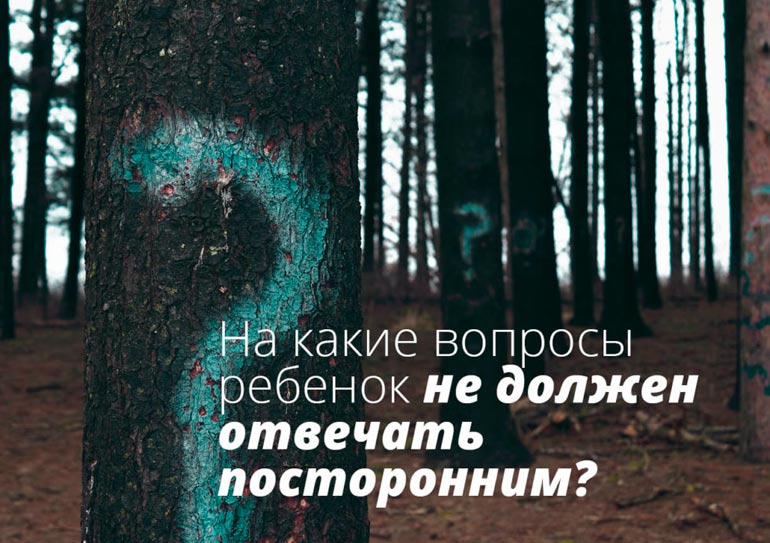
Inappropriate questions and expressions are more common among children. But sometimes it happens that an adult is able to ask a completely ridiculous or tactless, even dangerous question to your child. One day your baby will grow up and communicate with other people unattended. The crumbs in the playground have the opportunity to meet a stranger. And for children who have already gone to school, the likelihood of such a meeting increases many times. Simplicity, openness and a willingness to tell everything about your life does not always bring to good.
You should know 10 types of questions, the answers to which the child should not be given even to familiar people. And he must do this, not only for ethical reasons, but also for the sake of his own well-being and security.
1. Questions about the address of residence
Even if your child is still small, and you are not leaving him alone, it will still be better for him to know that in a normal situation it is better not to communicate with strangers. A simple “hello” or “thank you” is enough, depending on the situation. If it happened that the child was lost, then he will have to turn to outsiders for help (this situation is unusual). It is very important to negotiate with your baby in advance all those things that are not worth discussing with strangers.
Remember, a child alone (especially a small one) will not be able to figure out, will not be able to assess the situation and will not be able to navigate independently what questions should not be answered.
Strangers (even if he introduced himself as your new neighbor) can’t categorically answer such questions: “What is your address?”, “Where do your windows go?”, “What apartment do you live in?” / What is the number of your apartment? ”,“ Who do you have at home? ”.
Of course, an exception may be emergency situations when help is required immediately - for example, one of the adults became ill at home, a pipe broke in the apartment, in a quart, etc.
But, unfortunately, the static data claims that the greatest danger is posed by just familiar people who know very well where the child lives.
The child needs to be explained that the neighbor, the grandmother, whom they meet every day on the way to kindergarten / school, a nice woman or any other NOT suspicious people are all behind a circle of trust.
2. Prohibition of questions about when a child is alone
The fact is that children trust a familiar person much more, therefore they can easily answer all his questions in detail. Teach your kid that even neighbors and acquaintances should not be told about the time when he is alone. Questions: “What time do you go for a walk?”, “Do you walk alone, without parents?”, “When are you alone at home?”»Must be ignored by the child.
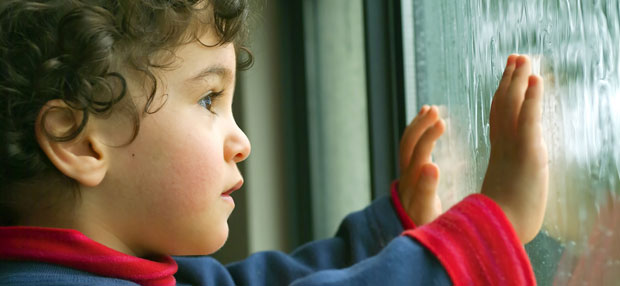
Remember that adults can ask the above questions in more subtle ways: “Who are you at home now?”, “How long does the crown have classes at school?”, “How long do your parents work?”, “Are you afraid when you are left alone?”, “Who are you with while your parents are on work? ”
It’s hard even to imagine why such an adult might need such information. An outsider should not be interested in this at all, so the child may simply not respond.
3. Departure questions
This is another category of questions, the answers to which should become a taboo for your baby. “Where are you going on the weekend?”, “How long will you go to the country?”, “Will you go to the sea this summer?”, “Who will water the flowers at your place?”. It is normal for adults to ask such questions from each other, but not to children. If you need to leave your home for a couple of days, notify your neighbors about this and note that no one was left with the keys.
Ask yourself why unfamiliar people who do not even communicate with you are interested in such things. It is unlikely that out of simple curiosity. Perhaps they are interested in this, hoping that the baby will naively give out any information, and then this conversation will be quickly forgotten.
4. Help questions
Some of the most dangerous questions are considered when a stranger or a stranger asks a child for help or offers him help. without special need or agreement with the child’s parents.
For instance, “Please lead me to that house”, “Help me bring the bags from the store home” or "Can I take you home?", "Let's do the math together?"
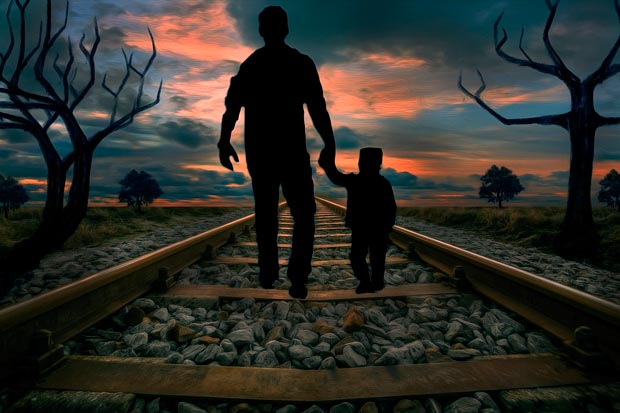
An adult should not ask a child to go with him to the basement for a kitten, to a neighboring house or for help.
Be sure to teach your child to respond with a clear refusal. Do not come up with some good reasons. “Sorry, but no” would be the most ideal answer.
READ ALSO: 7 rules your child must learn to protect himself from strangers
5. Cash Issues
From an ethical point of view, even in the world of adults, a discussion of the financial situation is not correct. But there are people for whom the topic of finance is so important that they can even ask a child: “How much does your father get?”, “Where do you keep money at home?”, “How much did the trip to the mountains cost you?”, “How much money do your parents pay for your sister’s education?”, “What are you going to buy for the New Year?” .
Why do people need such information? This of course does not mean that they are definitely going to rob you.
Perhaps they just need financial help - they want to ask you for a loan.There are other motives: to transfer this information to your ex-husband / wife, to condemn you for “helping the elderly parents a little” to discuss your financial situation with friends or to condemn you for “embezzlement” - for example, you bought a car and your child goes to old shoes, or just discuss with your neighbors on a bench how you “giggle” or “make ends meet” ... etc ...
6. Offensive questions
Not all issues threaten the safety of children; sometimes they simply offend or humiliate a child. This category of questions is loved by difficult teenagers and just angry people. Sometimes it happens that a person unknowingly puts a child in an awkward position, asking one of these questions: “Have you stuttered from birth?”, “How much do you weigh?”, “Why aren't you as strong as a brother?”, “Why are you studying worse than your younger sister?”"," Why are you not at all like a beautiful sister "... etc.

Such abusive questions should be ignored by children. Better yet, if you teach your son or daughter how to properly respond to such boorish treatment.
Is it worth answering rudeness to rudeness? Hardly. The answer directly depends on the child's communication skills, experience, and sometimes courage. You can explain the child how to be in such situations, based on his age, nature, behavior.
7. Questions about family secrets
If you want the secrets within the family to remain secrets, it is better not to tell them even to the child. But this is not always possible to do.
Each family has its own secrets, and therefore questions can be varied. Most often, family secrets may suggest some unpleasant fact. The following questions follow from this: “Are your parents really not relatives?”, “Does your mother probably rarely do house cleaning?”, “Was your grandmother taken to a psychiatric clinic?”, “Did your sister have an abortion?”, “And who is your dad?” , "Grandfather fired for drunkenness?".
You should teach your child to simply skip such questions. People ask them out of stupid curiosity. Moreover, they are so ignorant that they forget - such conversations can deeply traumatize the fragile children's psyche.
Sometimes with the help of children, acquaintances, relatives or friends try to find out information. It is worth explaining to the child that the issues of health, finance, personal relations within the family are the business of the family itself, and not of strangers.
8. Awkward questions
Question “Do you know who threw trash in the porch yesterday?” can lead a child into an awkward position if he is involved in this story. But children should answer such questions, even if it is unpleasant.
But giving answers to questions too personal or those that cause frank embarrassment is definitely not worth it. Initially, this includes all sorts of questions of an intimate nature. For example, a young girl can calmly ignore the question of her virginity, even if a relative asked her about it. The child may also not answer the question of whether the parents are sleeping together.
9. Questions about other people's personal lives
It goes without saying that polite questions like "How is your grandmother's health?" are a manifestation of ordinary friendship.
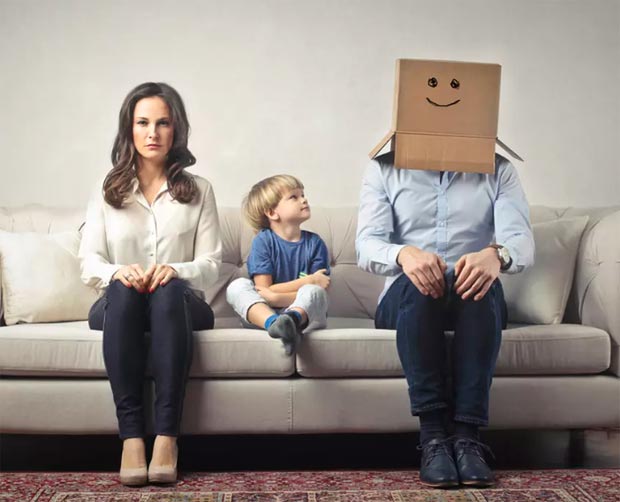
But if an adult is trying to find out personal information from a child about some familiar family, he can be safely ignored. “What did your parents give Aunt Inna for the anniversary?”, “Does the man who cares for his mother have children?”". More often than not, people ask this specifically from children. After all, they understand that it is simply impolite and unethical to ask about it in adults.
10. Provocative issues
Another category of issues that is fraught with considerable danger. Such questions are designed to provoke a child to a certain and probably unsafe act. "You are weak to do this ..?", "Let's bet that it won’t work out for you ..?" - most often such questions are not asked at school competitions, when it comes to getting first place on the 100 meter run ...
And this is a real and dangerous trick, which students are engaged in. And your child must be aware of this.
READ ALSO:
- 10 precautions that parents should educate their child
- How not to lose a child in an unfamiliar place: 5 simple tips
- How to teach a child to talk with strangers on the street
- A stranger sticks to a child - what should children do?
Consultation of Marina Romanenko: child safety - 5 rules of conduct with strangers


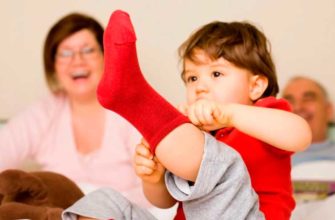






We teach our children how to respond to such questions, but the eldest daughter (9 years old) is embarrassed and puts everything as it is. And the answers of the youngest son (5 years) are sometimes perceived as rudeness. Therefore, the character and temperament of the child himself plays a large role.
And the simplest advice is to teach the child not to talk to strangers and unfamiliar people at all. Then you will not have to answer different questions. In our family, children have known this since they started talking. For them, this is the law.
A lot depends on the nature of the child. My daughter doesn’t close her mouth for a minute. She can still be taught not to answer any specific questions, but a small step away from this question, and please, put everything out with the smallest details. And the son is the exact opposite. Even once again he will not answer his name.
I immediately began to teach my child not to talk with strangers. Now she is hiding behind me and confused when talking with strangers. And the older child, on the contrary, is overly sociable, I am more worried about him.
My child has many adults, and strangers, or rather, mothers in the sandbox said that he was small. To which he replied to everyone that the spool was small, it was expensive;)) And the people immediately retreated 😉 And from childhood she taught that adults should not go anywhere and did not tell anything!
I was taught from childhood: let it be better that you appear impolite than the irreparable happens. By this, even in my childhood, I always meant death. 🙁
And rightly so! Why answer what is your name? A normal adult usually does not need to know this. He wants to be touched by children? Please, but without questioning.
And if an adult asks for a name without malicious intent, then he is just stupid and ill-mannered, there is also nothing to communicate with.
The whole article is complete nonsense and does not work in life with any child. brains are very different from 8 to 10 years. grabbed the tops and combined.
There were cases when the girls were taken away from the yard under the pretext of “Let's go and show you a kitten” - well, or a puppy, no matter. Children are being led by cute animals, I warned my dotsim not to go.
Or there have been cases that adult women come up and give chocolate candy. In this case, there may be a needle or a pushpin in a candy. The motives for such actions are completely incomprehensible to me, but warned means armed.